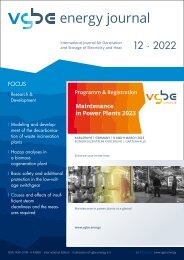VGB POWERTECH 11 (2019)
VGB PowerTech - International Journal for Generation and Storage of Electricity and Heat. Issue 11 (2019). Technical Journal of the VGB PowerTech Association. Energy is us! Power plant operation: legal & technology. Pumped hydro storage. Latent heat storages.
VGB PowerTech - International Journal for Generation and Storage of Electricity and Heat. Issue 11 (2019).
Technical Journal of the VGB PowerTech Association. Energy is us!
Power plant operation: legal & technology. Pumped hydro storage. Latent heat storages.
You also want an ePaper? Increase the reach of your titles
YUMPU automatically turns print PDFs into web optimized ePapers that Google loves.
50 Jahre KRAFTWERKSSCHULE/50 Years of KWS Training Center<br />
A journey through 100 years <strong>VGB</strong> | <strong>VGB</strong> <strong>POWERTECH</strong> 4 (2006)<br />
50 Jahre<br />
KRAFTWERKS-<br />
SCHULE E.V.<br />
Stationen auf dem Weg<br />
50 Years<br />
of KWS PowerTech<br />
Training Center<br />
Way Stations<br />
Der Anfang<br />
The Beginning<br />
Als die Arbeitsgemeinschaft „Kraftwerksmeisterausbildung“ am<br />
10. April 1957 ihre Arbeit aufnahm, was wir auch als Geburtsstunde<br />
der KRAFTWERKSSCHULE E.V. betrachten, geschah das nicht<br />
aus einer spontanen Eingebung der Verantwortlichen heraus. Die<br />
deutsche Energiewirtschaft, welche die Arbeitsgemeinschaft initiiert<br />
hatte, zog damit vielmehr die logische Konsequenz aus einer Entwicklung,<br />
deren Ursprünge beinahe vier Jahrzehnte zurücklagen<br />
(Bild 1).<br />
Es war im März 1920, als bei einem Unfall im Kraftwerk Reisholz<br />
bei Düsseldorf ein Kessel explodierte, wobei 28 Menschen ums<br />
Leben kamen. Das unerwartete Versagen eines erst drei Jahre alten<br />
Kessels mit so verheerenden Folgen erschütterte auch andere Unternehmen<br />
der Energiewirtschaft.<br />
Schon im November desselben Jahres sind die Vertreter der 15 größten<br />
deutschen Elektrizitätswerke sowie führender Chemieunternehmen<br />
zusammengekommen und gründeten die Vereinigung der<br />
Großkesselbesitzer, kurz <strong>VGB</strong>, die seit 2001 den Namen <strong>VGB</strong><br />
PowerTech e.V. trägt.<br />
Ziel der Arbeitsgemeinschaft war zunächst lediglich die Erarbeitung<br />
und Durchsetzung umfassender Qualitätsstandards für die Kessel,<br />
die in den Kraftwerken der <strong>VGB</strong>-Mitgliedsunternehmen verwendet<br />
wurden.<br />
Diese Standards wurden im Laufe der Zeit auch auf viele andere<br />
technische Bereiche des Kraftwerksbetriebes in Form von <strong>VGB</strong>-<br />
Richtlinien erweitert. Durch die immer größere Mitgliederzahl der<br />
<strong>VGB</strong> sind sie bald zu allgemeingültigen technischen Sicherheitsstandards<br />
geworden.<br />
Angesichts dieser Entwicklung war es nur konsequent, dass auch die<br />
Ausbildung des Kraftwerkspersonals in den Blickpunkt des Interesses<br />
der Energiewirtschaft geriet und zu einer der größten Herausforderungen<br />
nach dem 2. Weltkrieg wurde. Mit der allmählichen<br />
wirtschaftlichen Genesung Deutschlands ging ein geradezu<br />
dramatischer Auf- und Ausbau der westdeutschen Kraftwerkskapa-<br />
When the “Power Plant Shift Supervisor Training” task force got under<br />
way on April 10th, 1957 in Essen, the individuals involved were<br />
not motivated by some sudden inspiration. Instead, the German energy<br />
suppliers responsible for initiating the task force had arrived at the<br />
logical conclusion of a process than had begun almost four decades<br />
earlier (Figure 1).<br />
In March, 1920, 28 people died when a boiler exploded in an accident<br />
at the Reisholz power plant near Düsseldorf. The devastating<br />
consequences of the unexpected failure of a boiler barely three years<br />
old caused great anxiety not just at the power plant operator, but<br />
among other companies of the German energy sector as well.<br />
On November 29th, 1920, representatives of the 15 largest German<br />
power utilities and of leading businesses of the chemical industry<br />
gathered in the city of Merseburg in order to found the <strong>VGB</strong>, the<br />
Vereinigung der Großkesselbesitzer (Association of Large Boiler<br />
Owners), called <strong>VGB</strong> PowerTech e.V. since 2001. Initially, the association´s<br />
goal was to work out and implement comprehensive quality<br />
and durability standards for boilers installed in the power plants of<br />
<strong>VGB</strong>´s members.<br />
Over the years, <strong>VGB</strong> expanded its standards on many other aspects<br />
of power plant operations, covering them with respective guidelines.<br />
Thanks to a steadily growing number of <strong>VGB</strong> members, technical<br />
safety standards soon became universally accepted.<br />
Given this development, it was no surprise that companies in the<br />
energy sector focused increasingly on the training of power plant<br />
personnel, an issue that was to become one of the greatest challenges<br />
after World War II. Germany´s economic recovery was accompanied<br />
by a dramatic expansion of West German power plant capacities.<br />
Autoren/Authors<br />
Dipl.-Ing. Uwe Möller<br />
KRAFTWERKSSCHULE E.V., Essen/Deutschland.<br />
Dr. Karl A. Theis<br />
Geschäftsführer,<br />
KRAFTWERKSSCHULE E.V., Essen/Deutschland.<br />
Dipl.-Ing. Heinrich Nacke<br />
Schulleiter,<br />
KRAFTWERKSSCHULE E.V., Essen/Deutschland.<br />
Bild 1. Kraftwerk Kupferdreh (1962).<br />
Figure 1. Kupferdreh Power Plant (1962).<br />
32 <strong>VGB</strong> PowerTech <strong>11</strong>/2007<br />
84


















